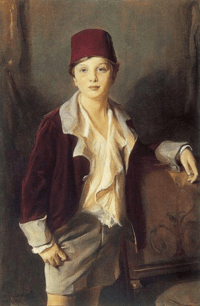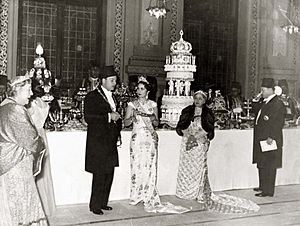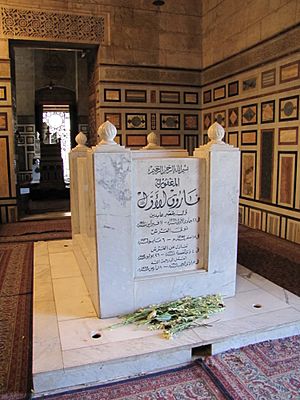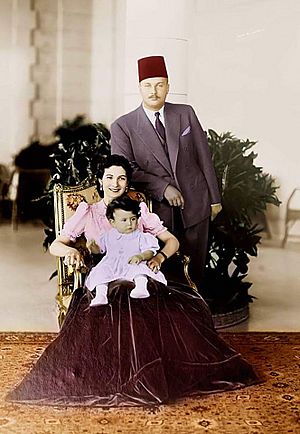Farouk of Egypt facts for kids
Quick facts for kids Farouk Iفاروق |
|||||
|---|---|---|---|---|---|
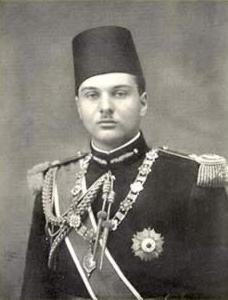
Farouk I in 1946
|
|||||
| King of Egypt and the Sudan | |||||
| Reign | 28 April 1936 – 26 July 1952 | ||||
| Coronation | 29 July 1937 | ||||
| Predecessor | Fuad I | ||||
| Successor | Fuad II | ||||
| Regents |
See list
Prince Muhammad Ali Tewfik
Aziz Ezzat Pasha Sherif Sabri Pasha |
||||
| Prime Ministers |
See list
Mustafa el-Nahhas Pasha
Muhammad Mahmoud Pasha Ali Mahir Pasha Hassan Sabry Pasha Hussein Sirri Pasha Ahmad Mahir Pasha Mahmoud an-Nukrashi Pasha Isma'il Sidqi Pasha Ibrahim Abdel Hadi Pasha Ahmad Najib al-Hilali |
||||
| Born | 11 February 1920 Abdeen Palace, Cairo, Sultanate of Egypt |
||||
| Died | 18 March 1965 (aged 45) San Camillo Hospital, Rome, Italy |
||||
| Burial | Al-Rifa'i Mosque, Cairo, Egypt | ||||
| Spouse |
|
||||
| Issue |
|
||||
|
|||||
| House | Alawiyya | ||||
| Father | Fuad I of Egypt | ||||
| Mother | Nazli Sabri | ||||
| Religion | Sunni Islam | ||||
| Signature | |||||
Farouk I (/fəˈruːk/; Arabic: فاروق الأول Fārūq al-Awwal; 11 February 1920 – 18 March 1965) was the tenth ruler of Egypt from the Muhammad Ali dynasty. He was also the last King of Egypt and Sudan. Farouk became king after his father, Fuad I, in 1936.
His full title was "His Majesty Farouk I, by the grace of God, King of Egypt and the Sudan". As king, Farouk was known for his expensive lifestyle. At first, people liked him. But his popularity went down because his government faced problems and was seen as unfair. He was removed from power in the 1952 coup d'état. He had to give up his throne to his baby son, Ahmed Fuad, who became Fuad II. Farouk died in another country, Italy, in 1965.
His sister, Princess Fawzia Fuad, was the first wife and queen of the Shah of Iran, Mohammad Reza Pahlavi.
Contents
Early Life and Education
Farouk was born on 11 February 1920, in Abdeen Palace, Cairo. He was the oldest child of Sultan Fuad I (who later became King Fuad I) and his second wife, Nazli Sabri. His family had roots from different places like Albania, Circassia, Turkey, France, Egypt, and Greece. Farouk was proud of his Albanian heritage. As king, he had 30 Albanian bodyguards because he felt he could trust them.
Farouk's first languages were Egyptian Arabic, Turkish, and French. These were the languages spoken by the wealthy people in Egypt. He saw himself as Egyptian, not Arab. He was not very interested in Arab nationalism, unless it helped Egypt become more powerful in the Middle East. Egypt was a rich country then, but its wealth was not shared fairly. A small group of rich landowners owned a large part of the country's farming land.
Farouk had five sisters: Fawzia, Faiza, Faika, Fathia, and Fawkia (from his father's first marriage). King Fuad gave all his children names starting with "F" because a fortune-teller said it would bring good luck. Farouk grew up in the royal palaces and was very protected. He did not visit the Great Pyramids of Giza until he became king, even though they were close to his palace. He had a very spoiled childhood. He did not have friends outside his family because his father did not allow it.
His father, Fuad, wanted Farouk to learn Arabic so he could speak to his people. Farouk became good at classical Arabic, the language of the Quran. He also learned English, French, and Italian. These were the only subjects he was good at in school. Some of his teachers wrote that he needed to study more and improve his handwriting. Others praised him, even for simple essays. Farouk liked playing jokes, even as an adult. For example, he once used an air gun to shoot windows at the Koubbeh Palace.
Farouk's closest friend was Antonio Pulli, an Italian electrician at the Abdeen Palace. Pulli became an important person during Farouk's reign. Farouk tried to go to the Royal Military Academy, Woolwich, in England, but he failed the entrance exams. Before his father died, he was studying there. His father wanted him to study at a military academy in Italy, but British officials did not agree.
In October 1935, Farouk went to England to attend the Royal Military Academy. He went to classes sometimes but still failed the entrance exam. Instead of studying, Farouk spent time in London. He went shopping, watched football games, and visited restaurants. When King George V died in January 1936, Farouk represented Egypt at his funeral.
On 28 April 1936, King Fuad died. Farouk left England to return to Egypt as king. His first stop was Buckingham Palace to receive condolences from King Edward VIII, whom Farouk liked. He then traveled back to Egypt, arriving in Alexandria on 6 May 1936. Huge crowds greeted him, shouting "Long live the king of the Nile!" and "Long live the king of Egypt and the Sudan!" In 1936, people called Farouk al malik al mahbub ("the beloved king"). Besides the throne, Farouk also inherited a lot of land and a huge fortune.
Becoming King
Farouk was very popular with the Egyptian people. The Prime Minister, Aly Maher, decided Farouk should stay in Egypt. Some British officials hoped to guide Farouk to be more pro-British. However, Farouk was more interested in hunting than in lectures. He also did not like the British ambassador, Sir Miles Lampson, who he felt treated him like a child. Farouk dismissed all the British servants his father had hired, but kept the Italian ones.
Farouk enjoyed the glamorous royal life. Even though he had a lot of land, palaces, and cars, he often went to Europe for big shopping trips. This made some of his people unhappy. He was known for eating a lot of oysters. He owned a special red Bentley car. In 1951, he bought a very valuable diamond called the Star of the East.
Farouk was very popular in his early years, especially with the wealthy families. For example, during his accession, a rich family arranged for the royal train to stop in their village to offer him refreshments. His popularity was also due to his youth and his mother's Egyptian background. He was tall and handsome, appearing on the cover of Time magazine.
However, Farouk often argued with Egyptian politicians and government officials. He also disliked the strong British influence in the government. The Wafd Party, led by Nahas Pasha, was the most popular party. They felt threatened by Farouk's popularity and tried to limit his power. Farouk, in turn, disliked the Wafd Party.
The Wafd Party was very powerful but also faced accusations of corruption. Farouk allied himself with groups that opposed the Wafd Party and the treaty that allowed British troops to stay in Egypt.
Even though there was a council to help him rule, Farouk wanted to make his own decisions. When the council refused to build a new train station for him, he had his servants demolish the old one, forcing the council to agree. To gain more support, Farouk started to use Islam as a political tool. He attended Friday prayers, gave to charities, and connected with the Muslim Brotherhood. People called him the "pious king" because he showed himself as a devout Muslim. The Wafd Party, which was more secular, criticized his religious displays, but this made conservative Muslims support Farouk even more.
Sir Edward Ford, Farouk's tutor, described him as a relaxed and friendly teenager who was not good at concentrating. Farouk often found ways to avoid lessons. Ford noted that Farouk had a "royal eye" for valuable things. When Farouk toured Upper Egypt, he was more interested in watching Hollywood films than in lessons. Local leaders held big events for him, which Ford described as "unrivaled stardom."
On 29 June 1937, Farouk turned 17 by the Islamic calendar, which meant he was considered 18 and old enough to rule. The council that had been helping him rule was dissolved. His coronation in Cairo on 20 July 1937, was a huge event with large parades and fireworks. Many ordinary Egyptians traveled to Cairo to see it. In his coronation speech, Farouk spoke about helping the poor. This speech was written by his tutor, the poet Ahmed Hassanein, to make the king seem like a friend to the common people.
Farouk's popularity grew even more when he announced his engagement to Safinaz Zulficar, the daughter of a judge, on 24 August 1937. He chose to marry an ordinary person instead of a princess, which pleased the Egyptian people. The marriage was arranged by his mother, Queen Nazli. Farouk renamed Safinaz to Farida, believing names starting with "F" were lucky. He gave her a large sum of money and a diamond ring. When the wedding was announced, many people gathered, and some were injured in the crowd.
In late 1937, Farouk dismissed the Wafd government and appointed a new prime minister. This was seen as a move against the British. The British ambassador, Lampson, warned Farouk, but the king insisted on having a prime minister who would obey him, not Parliament.
On 20 January 1938, Farouk married Farida in a grand public event in Cairo. The city was lit up with lights. Farida wore a very expensive wedding dress from Paris. The royal wedding made Farouk even more popular. He then called for new elections, and parties against the Wafd Party won by a lot. In 1938, Farouk agreed to marry his sister, Princess Fawzia, to Mohammad Reza, the Crown Prince of Iran.
Farouk broke with some traditions by taking Queen Farida everywhere with him and letting her go unveiled. On 17 November 1938, Farida gave birth to Princess Farial. Farouk was disappointed because he wanted a son, especially since his cousin, Prince Mohammad Ali, was hoping to take the throne. In March 1939, Mohammad Reza married Fawzia in Cairo. In April 1939, Farouk met with German propaganda minister Dr. Josef Goebbels, which worried the British. In August 1939, Farouk appointed his favorite politician, Maher Pasha, as prime minister.
World War II and Challenges
Egypt stayed neutral during World War II, but under British pressure, Farouk ended diplomatic relations with Germany in September 1939. On 7 April 1940, Queen Farida gave birth to a second daughter, Princess Fawzia, which again upset Farouk. He wanted a son for the kingdom's future, as daughters could not inherit the throne under Egyptian law at the time.
Under a 1936 treaty, Britain could defend Egypt from invasion. When Italy declared war on Britain in June 1940, the Western Desert of Egypt became a battlefield. Egyptians were supposed to help the British, but Prime Minister Maher made it difficult by appointing officials who asked for bribes. Farouk dismissed Maher in June 1940, but refused to appoint Nahas Pasha, whom the British wanted.
By 1941, German forces arrived in Libya and pushed the British back into Egypt. Farouk secretly wrote to Adolf Hitler, promising to join the Axis side if German troops reached the Nile. However, historians note that Farouk did not seem to understand that Axis rule would be much harsher than British rule.
During the war, people criticized Farouk for his lavish lifestyle. He kept the lights on at his palace in Alexandria even when the city had blackouts due to bombing. This was different from the British royal family, who also faced bombings. Many Egyptians, including Farouk, were sympathetic to Germany and Italy because of the British occupation.
In January 1942, the British ambassador, Sir Miles Lampson, forced the Egyptian prime minister to break ties with Vichy France without consulting Farouk. Farouk used this as an excuse to dismiss the prime minister and planned to appoint Maher again. Lampson then threatened to remove Farouk from the throne.
On the night of 4 February 1942, British soldiers surrounded Abdeen Palace in Cairo. Lampson presented Farouk with a paper to sign, which would make him give up his throne. Farouk was about to sign, but his advisor, Prince Hassanein, spoke to him in Turkish. Farouk then agreed to appoint Nahas Pasha as prime minister. This event, known as the Abdeen Palace incident, greatly humiliated Farouk. It also made many Egyptians, especially in the military, lose trust in both the British and the Wafd Party.
After this humiliation, Farouk became less interested in politics and focused on enjoying himself. He had a great passion for collecting things, from Coca-Cola bottles to ancient Egyptian artifacts. He also loved food and sweets, which led to him gaining a lot of weight. He spent many nights at the Auberge des Pyramides nightclub in Cairo, socializing and sometimes acting childishly. Cairo was a glamorous city then, and many celebrities visited, meeting the king.
Farouk met various Allied leaders. South African Prime Minister Jan Christian Smuts found him "surprisingly intelligent." U.S. Senator Richard Russell Jr. thought he was "an attractive, clear-eyed young man." However, a meeting with British Prime Minister Winston Churchill in August 1942 did not go well when Farouk took Churchill's watch as a joke.
The Wafd government under Nahas Pasha faced accusations of corruption. In March 1943, a former Wafd leader, Makram Ebeid, published a book detailing many cases of corruption involving Nahas. Farouk tried to use this to dismiss Nahas, but Lampson warned him against it.
In November 1943, Farouk was in a car accident and broke two ribs. He stayed in a British Army hospital longer than needed because he enjoyed flirting with the nurses. He missed the Cairo Conference where U.S. President Franklin D. Roosevelt, Winston Churchill, and Chinese Generalissimo Chiang Kai-shek met. On 15 December 1943, Farida gave birth to another daughter, Princess Fadia, which again disappointed Farouk.
In 1944, Farouk tried to dismiss Nahas again due to his handling of a malaria epidemic. Farouk felt Nahas was acting like a rival king. Lampson again tried to have Farouk removed, but British officials felt it would cause too much trouble. By this time, many British officials believed Lampson's constant threats to Farouk were doing more harm than good.
In October 1944, when Lampson was on vacation, Farouk finally dismissed Nahas and replaced him with Ahmed Maher. This was seen as a victory for Farouk over Lampson. However, Lampson admitted that Nahas had become a problem due to his corruption.
On 6 November 1944, Lord Moyne, a British minister, was assassinated in Cairo by two Zionist extremists. Farouk faced pressure to pardon them but refused. The assassins were hanged in March 1945.
Farouk declared war on the Axis Powers in February 1945, after most of the fighting in Egypt had ended. He met President Franklin D. Roosevelt and Winston Churchill. Farouk wanted Egypt to be a founding member of the new United Nations, which would show the world that Egypt was becoming more independent from Britain. On 24 February 1945, Prime Minister Maher declared war on Germany and Japan. He was assassinated as he left Parliament. As a result, Egypt attended the conference that founded the United Nations.
The new prime minister, Mahmoud El Nokrashy Pasha, demanded that the British leave the Nile river valley. University students in Cairo also protested for the British to leave. The British government eventually agreed to a new relationship with Egypt. By September 1946, British troops had left the Nile valley, but talks broke down over the future of Sudan, which Farouk wanted to be part of Egypt.
Decline of Popularity
After World War II, Egypt was the richest country in the Middle East due to high cotton prices. However, this wealth was not shared fairly. Most Egyptians lived in extreme poverty. Many suffered from diseases that could have been prevented with clean water. The government's poor response to a cholera epidemic in 1947, which killed 80,000 people, also drew criticism. Farouk had presented himself as a friend of the poor, but his gestures, like throwing gold coins, were no longer enough. People wanted real social reforms, but Farouk was unwilling to make big changes. His personal life also started to harm his image.
Farouk's main advisors after 1945 were his "kitchen cabinet," including Antonio Pulli and others who were seen as greedy. Prince Hassanein warned Farouk about them, but he did not listen. In February 1946, Prince Hassanein died in a car accident.
In March 1946, Sir Ronald Campbell replaced Lampson as the British ambassador, which pleased Farouk. In May 1946, Farouk gave asylum to the former King of Italy, Victor Emmanuel III. This damaged Farouk's image because Victor Emmanuel had supported the Fascist regime. In June 1946, Farouk also gave asylum to Amin al-Husseini, the Grand Mufti of Jerusalem, who was wanted for war crimes. Farouk hoped al-Husseini's presence would pressure the British to leave Egypt.
Having al-Husseini in Egypt brought more attention to the Palestine issue. Al-Husseini allied with the Muslim Brotherhood, which was growing very powerful. Farouk himself welcomed the Grand Mufti and his speeches against Zionism. Farouk was not personally against Jewish people, but he used the anti-Zionist stance to distract from problems in Egypt. In December 1947, a large protest in Cairo called for Egyptian action in Palestine. Many Egyptians believed that a war against the new state of Israel would be an easy victory.
Farouk decided to go to war with Israel in May 1948, even though his prime minister, Mahmoud El Nokrashy Pasha, advised against it. Farouk feared the growing popularity of the Muslim Brotherhood, who wanted war. The war ended badly for Egypt. The Egyptian Army performed poorly, and there were accusations that a member of Farouk's "kitchen cabinet" sold them faulty weapons. This defeat made people see the 1942 Abdeen Palace incident as a shameful surrender, showing Farouk's weakness.
The Muslim Brotherhood turned their anger against the government after the war. In October 1948, a member killed the Cairo police chief. On 17 November 1948, Farouk divorced the popular Queen Farida, which shocked the Egyptian people. On the same day, the Shah of Iran also divorced Princess Fawzia. In December 1948, Prime Minister Nokrashy Pasha was assassinated. In January 1949, Egypt signed a peace agreement with Israel, gaining only the Gaza Strip.
Farouk continued his lavish lifestyle. His advisors suggested he marry again to regain popularity. They chose Narriman Sadek, who was already engaged. Farouk's actions led to her engagement being broken off. After their engagement, Farouk sent Narriman to Rome to be trained as a queen.
In January 1950, Farouk formed an alliance with Nahas Pasha, who became prime minister again. Nahas's government was seen as very corrupt. The Korean War led to a cotton boom in Egypt, but farmers were forced to grow more cotton instead of food, causing food shortages and inflation. While the people faced problems, Farouk went on a two-month-long bachelor party in Europe, spending huge amounts of money.
In 1950, Farouk was one of the world's richest men. He spent extravagantly during his trip to Europe, gambling and buying expensive items. He bought a $2 million private train from Fiat. His spending and lifestyle made him very unpopular. Upon his return, he received an anonymous letter warning of a revolt.
To distract people from his spending, Farouk demanded the British leave Egypt. Prime Minister Nahas announced that removing British forces and ending their control over Sudan would be the government's top priority. On 11 February 1951, Farouk announced his wedding date to Narriman Sadek. They married on 6 May 1951, in a grand ceremony.
However, his three-month honeymoon in Europe, where they spent vast sums of money, further damaged his image. While Farouk was away, Nahas canceled the 1936 Anglo-Egyptian Treaty in October 1951, making himself a hero. This meant British forces in the Suez Canal were considered enemies. Egypt cut off supplies to the British base and began guerrilla attacks.
In December 1951, Farouk supported a general for the president of the Cairo Officers' Club. However, General Mohamed Naguib won, showing growing military dissatisfaction with the king. Farouk tried to cancel the election results. Queen Narriman gave birth to Crown Prince Fuad on 16 January 1952, finally giving Farouk a son.
On 24 January 1952, Egyptian guerrillas attacked the British base. The next day, British tanks surrounded a police station in Ismailia, leading to a battle where 43 policemen were killed. This incident angered Egyptians. On 26 January 1952, "Black Saturday" occurred, where much of downtown Cairo was burned down in riots. Farouk ordered the army to stop the riots, but it was too late. He blamed the Wafd Party and dismissed Nahas.
"Black Saturday" showed that many Egyptians felt their political system did not represent them. For the next six months, Farouk changed prime ministers often, trying to meet demands for reform. People wanted a leader who would end corruption and force the British to leave.
Overthrow and Exile
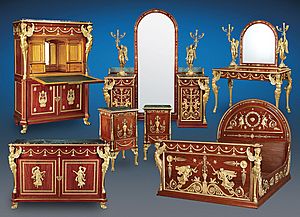
Farouk was widely criticized for his government's problems, its failure to remove foreign influence, and the Egyptian army's defeat in the 1948 Arab–Israeli War. Public anger against Farouk grew. The 1951 film Quo Vadis was banned in Egypt because people might compare the fat Emperor Nero to Farouk.
On the night of 20 July 1952, Farouk was gambling in Alexandria when he learned that the Free Officers were planning a coup. He dismissed the threat, thinking the officers were too junior. He appointed his brother-in-law as War Minister, ordering him to "clean up" the army.
This appointment pushed the Free Officers, led by General Muhammad Naguib and Colonel Gamal Abdel Nasser, to act quickly. On the night of 23 July 1952, they launched a military coup, starting the Egyptian Revolution of 1952. By 1:30 am, Cairo was under their control.
In Alexandria, Farouk asked the American and British ambassadors for help, but they refused to intervene. On 24 July, Ali Maher, who sided with the Free Officers, told Farouk that the officers wanted him to appoint Naguib as War Minister and dismiss his "kitchen cabinet." On 25 July, Farouk went to the Ras El Tin Palace, which was guarded by his loyal Sudanese Guard. Troops loyal to the Free Officers surrounded the palace and tried to storm it, but were pushed back. Farouk, a good marksman, even shot some attackers himself.
On the morning of 26 July 1952, Maher presented Farouk with an ultimatum: he must give up his throne and leave Egypt by 6 pm the next day, or the troops would storm the palace and execute him. Tanks and artillery had arrived outside the palace. Farouk agreed to abdicate. Around 12:30 pm, he signed the abdication papers. At about 5:30 pm, Farouk left the palace, said goodbye to his friend Pulli, and boarded the royal yacht El Mahrousa to leave Egypt forever.
Farouk was forced to give up his throne and went to live in Monaco and Italy. His baby son, Ahmed Fuad, was named King Fuad II, but Naguib, Nasser, and the Free Officers now truly ruled Egypt. On 18 June 1953, the new government officially ended the monarchy, and Egypt became a republic.
The Egyptian government quickly sold off Farouk's huge collection of items. This included his seven-piece bedroom suite and a very rare American gold coin. Farouk collected many things, such as diamonds, stamps, and ancient coins. At the Koubbeh Palace, it was found that he had collected 2,000 silk shirts, 10,000 silk ties, and 50 diamond-studded walking sticks.
The 94-carat Star of the East diamond, which Farouk had bought, was not paid for by the time he was overthrown. After several years, the jeweler was able to get the diamond back.
Life in Exile and Death
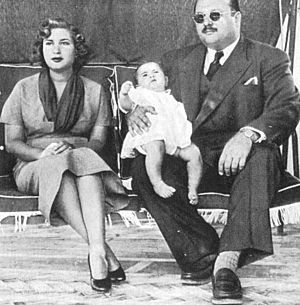
Farouk left Egypt quickly, and his abandoned belongings became objects of curiosity. He first settled in Naples, then in Rome. At his first press conference, he claimed to be poor, but he hired a famous lawyer and rented a huge estate. In October 1952, he was accused of treason in Egypt. In exile, he was known as the "king of the night," spending time in Roman nightclubs with actresses. Despite his claims of poverty, he sent all his children to a very expensive private school in Switzerland.
On 13 March 1953, his former wife, Queen Narriman, left him and returned to Egypt. She divorced him in September 1953, saying he was unfaithful.
In 1959, Farouk was given citizenship in Monaco by his friend Prince Rainier III. His daughter, Princess Ferial, remembered him as a loving father in exile. In his last years, Farouk continued to visit nightclubs and spent his days at the Café de Paris in Rome. He disliked the social changes of the 1960s.
Farouk died on 18 March 1965, after a dinner in Rome. Some people believe he was poisoned, but no official autopsy was done. His will stated he wanted to be buried in the Al Rifa'i Mosque in Cairo. However, the Egyptian government at the time refused. He was first buried in Italy. Later, during Anwar El-Sadat's presidency, his remains were moved to Al-Rifa'i Mosque, where other members of his family are buried.
Marriages and Children
Farouk was married twice. His first wife was Safinaz Zulficar (1921–1988). She was renamed Farida when they married in January 1938. Their marriage faced problems because Queen Farida did not have a son, which Farouk wanted for the throne. After having three daughters, they divorced in 1948.
In 1950, Farouk met Narriman Sadek (1933–2005). They married in 1951. She was eighteen years old. Farouk hoped she would give him a son, and she did. Their son, the future King Fuad II, was born on 16 January 1952. However, months after their son's birth, the king and queen were forced to leave Egypt. They divorced in 1954.
Farouk also had other relationships. In exile, he was with Irma Capece Minutolo, an opera singer. She claimed they married in 1957.
Children
| Name | Birth | Death | Spouse | Children |
|---|---|---|---|---|
| Princess Farial | 17 November 1938 | 29 November 2009 | Jean-Pierre Perreten Divorced 1967 |
Yasmine Perreten-Shaarawi (b. 1967) |
| Princess Fawzia | 7 April 1940 | 27 January 2005 | ||
| Princess Fadia | 15 December 1943 | 28 December 2002 | Pierre Alexievitch Orloff | Michael-Shamel Orloff (b. 1966) Alexander-Ali Orloff (b. 1969) |
| King Fuad II | 16 January 1952 | Dominique-France Loeb-Picard Divorced 1996 |
Muhammad Ali, Prince of the Sa'id (b. 1979) Princess Fawzia-Latifa (b. 1982) Prince Fakhruddin (b. 1987) |
Hobbies and Style
Coin Collection
King Farouk had one of the most famous coin collections in history. It included a very rare American gold coin, the 1933 double eagle, and two 1913 Liberty Head nickels.
In 1954, after he was exiled, the Egyptian government sold his coin collection. It was the biggest coin auction of the 20th century.
Furniture Style
Farouk's name is used to describe a type of furniture called "Louis-Farouk." This style is an imitation of the fancy Louis XV-style furniture from France. It became popular among wealthy Egyptians during Farouk's time. This furniture has detailed carvings, lots of gold decoration, and rich fabrics. This style is still common in Egypt today.
Honours
| Styles of Farouk I of Egypt |
|
|---|---|
 |
|
| Reference style | His Majesty |
| Spoken style | Your Majesty |
 Kingdom of Afghanistan: Collar of the Order of the Supreme Sun
Kingdom of Afghanistan: Collar of the Order of the Supreme Sun Albania: Collar of the Order of Fidelity of the Kingdom of Albania
Albania: Collar of the Order of Fidelity of the Kingdom of Albania Belgium: Grand Cordon of the Royal Order of Leopold
Belgium: Grand Cordon of the Royal Order of Leopold Kingdom of Bulgaria: Collar of the Order of Saints Cyril and Methodius
Kingdom of Bulgaria: Collar of the Order of Saints Cyril and Methodius Ethiopian Empire: Collar of the Order of Solomon
Ethiopian Empire: Collar of the Order of Solomon France: Grand Cross of the Order of the Legion of Honour
France: Grand Cross of the Order of the Legion of Honour Kingdom of Greece: Grand Cross of the Order of the Redeemer
Kingdom of Greece: Grand Cross of the Order of the Redeemer Kingdom of Iraq : Grand Cordon of the Order of the Hashemites' Dynasty
Kingdom of Iraq : Grand Cordon of the Order of the Hashemites' Dynasty Iran : Knight Grand Cordon with Collar of the Order of Pahlavi
Iran : Knight Grand Cordon with Collar of the Order of Pahlavi Kingdom of Italy: Knight Grand Cross of the Order of the Crown of Italy
Kingdom of Italy: Knight Grand Cross of the Order of the Crown of Italy Kingdom of Italy: Knight Grand Cross of the Order of Saints Maurice and Lazarus
Kingdom of Italy: Knight Grand Cross of the Order of Saints Maurice and Lazarus Kingdom of Italy: Collar of the Supreme Order of the Most Holy Annunciation
Kingdom of Italy: Collar of the Supreme Order of the Most Holy Annunciation Japan: Grand Cordon of the Order of the Chrysanthemum
Japan: Grand Cordon of the Order of the Chrysanthemum Jordan: Collar of the Order of Al-Hussein bin Ali
Jordan: Collar of the Order of Al-Hussein bin Ali Jordan: Grand Cordon of the Supreme Order of the Renaissance
Jordan: Grand Cordon of the Supreme Order of the Renaissance Kingdom of Libya: Collar of the Order of Idris I
Kingdom of Libya: Collar of the Order of Idris I Monaco: Knight Grand Cross of the Order of Saint-Charles
Monaco: Knight Grand Cross of the Order of Saint-Charles Morocco: Grand Cordon of the Order of Ouissam Alaouite
Morocco: Grand Cordon of the Order of Ouissam Alaouite Netherlands: Knight Grand Cross of the Order of the Netherlands Lion
Netherlands: Knight Grand Cross of the Order of the Netherlands Lion Spain : Knight Grand Cross with Collar of the Royal Order of Isabella the Catholic
Spain : Knight Grand Cross with Collar of the Royal Order of Isabella the Catholic Poland: Grand Cross of the Order of the White Eagle
Poland: Grand Cross of the Order of the White Eagle Portugal: Grand Cross of the Order of the Tower and Sword
Portugal: Grand Cross of the Order of the Tower and Sword Portugal: Grand Cross of the Sash of the Two Orders
Portugal: Grand Cross of the Sash of the Two Orders Kingdom of Romania: Collar of the Order of Carol I
Kingdom of Romania: Collar of the Order of Carol I Serbia: Collar of the Order of Karađorđe's Star
Serbia: Collar of the Order of Karađorđe's Star Tunisia: Grand Cordon of the Nichan Iftikhar
Tunisia: Grand Cordon of the Nichan Iftikhar US: Commander of the Legion of Merit
US: Commander of the Legion of Merit
Images for kids
See also
 In Spanish: Faruq de Egipto para niños
In Spanish: Faruq de Egipto para niños
 | James Van Der Zee |
 | Alma Thomas |
 | Ellis Wilson |
 | Margaret Taylor-Burroughs |


